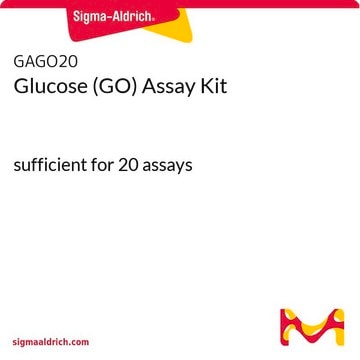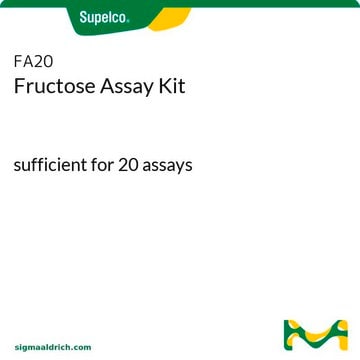MAK179
Oxalic Acid Colorimetric Assay Kit
Sufficient for 100 Colorimetric tests
Synonyme(s) :
Oxalate Assay Kit
Se connecterpour consulter vos tarifs contractuels et ceux de votre entreprise/organisme
About This Item
Produits recommandés
Méthode de détection
colorimetric
Maladie(s) pertinente(s)
genitourinary disorders
Température de stockage
−20°C
Description générale
Oxalic acid (Oxalate) is a strong dicarboxylic acid that occurs in several plants and vegetables. In animals, it is either incorporated from the diet or produced during ascorbic acid and glyoxylic acid metabolism. Oxalic acid is not metabolized and is excreted in the urine. Hence, it can act as a marker for glyoxylic and ascorbic acid metabolism. Furthermore, oxalic acid has been studied as a pathogenic factor for Sclerotinia sclerotiorum that inhibits the oxidative burst response in host plants. It is also known to alleviate chilling injury in peach fruit. Elevated levels of oxalic acid (oxalate) have been associated with the formation of kidney stones. Hence, oxalate measurements can be used for the diagnosis and monitoring of renal stones.
Application
Oxalic acid colorimetric assay kit has been used in 24-hour urinary oxalate level (24HUOL) evaluation in an animal model.
Adéquation
Suitable for the detection of oxalate (oxalic acid) in biological samples including animal and plant tissue.
Principe
The Oxalic Acid Assay Kit provides a simple and sensitive procedure for measuring oxalic acid in variety of samples including animal and plant tissue. In this assay, oxalic acid concentration is determined by a coupled enzyme reaction, which results in a colorimetric (450 nm) product, proportional to the oxalate present.
Composants de kit seuls
Réf. du produit
Description
- Oxalate Assay Buffer
- Oxalate Developer Buffer
- Oxalate Converter
- Oxalate Enzyme Mix
- Oxalate Probe
- Oxalate Standard
Mention d'avertissement
Warning
Mentions de danger
Conseils de prudence
Classification des risques
Acute Tox. 4 Dermal - Acute Tox. 4 Oral
Code de la classe de stockage
10 - Combustible liquids
Certificats d'analyse (COA)
Recherchez un Certificats d'analyse (COA) en saisissant le numéro de lot du produit. Les numéros de lot figurent sur l'étiquette du produit après les mots "Lot" ou "Batch".
Déjà en possession de ce produit ?
Retrouvez la documentation relative aux produits que vous avez récemment achetés dans la Bibliothèque de documents.
Oxalic Acid, a Pathogenicity Factor for Sclerotinia sclerotiorum, Suppresses the Oxidative Burst of the Host Plant.
Stephen G C, et al.
Plant Cell, 12(11), 2191?2200-2191?2200 (2000)
Characterizing the Association Between Toll-like Receptor Subtypes and Nephrolithiasis With Renal Inflammation in an Animal Model.
Olcucu M T, et al.
Urology, 111 , 238-e1-238-e1 (2018)
Strategies for preventing calcium oxalate stones
Vadim A F, et al.
CMAJ : Canadian Medical Association Journal = Journal de l'Association Medicale Canadienne, 174(10), 1407-1409 (2006)
Oxalic acid excretion after intravenous ascorbic acid administration
Line R, et al.
Metabolism, Clinical and Experimental, 58(2) , 263-269 (2009)
A structural investigation of the interaction of oxalic acid with Cu(110)
White T W, et al.
Surface Science, 668, 134-143 (2018)
Notre équipe de scientifiques dispose d'une expérience dans tous les secteurs de la recherche, notamment en sciences de la vie, science des matériaux, synthèse chimique, chromatographie, analyse et dans de nombreux autres domaines..
Contacter notre Service technique



